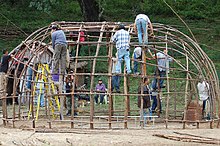| Kickapoo | |
|---|---|
| Metotheeneniaatoweeheni[1] | |
| Native to | United States, Mexico |
| Ethnicity | Kickapoo people |
Native speakers | (1200 cited 1978)[1] |
Algic
| |
| Dialects |
|
| Latin script | |
| Language codes | |
| ISO 639-3 | kic |
| Glottolog | kick1244 |
| ELP | Kickapoo |

Kickapoo (Kickapoo: Metotheeneniaatoweeheni)[1] is either a dialect of the Fox language or a closely related language, closely related to, and mutually intelligible with, the dialects spoken by the Sauk people and Meskwaki people. Their language is included in the Central Algonquian languages subgroup of the Algonquian languages family, itself a member of the Algic languages family.
In 1985, the Kickapoo Nation's School in Horton, Kansas, began a language-immersion program for elementary school grades to revive teaching and use of the Kickapoo language in kindergarten through grade 6.[2] Efforts in language education continue at most Kickapoo sites.
In 2010, the Head Start Program at the Kickapoo Traditional Tribe of Texas reservation, which teaches the Kickapoo language, became "the first Native American school to earn Texas School Ready! (TSR) Project certification."[3] Despite these efforts, there are no children who are first-language users of Kickapoo, as they choose to speak English instead.[1]
Also in 2010, Mexico's Instituto Nacional de Antropología e Historia participated in the elaboration of a Kickapoo alphabet.[4] The Kickapoo in Mexico are known for their whistled speech.
Texts,[5] recordings,[6] and a vocabulary[7] of the language are available.
The Kickapoo language and members of the Kickapoo tribe were featured in the movie The Only Good Indian (2009), directed by Greg Wilmott and starring Wes Studi. This was a fictionalized account of Native American children forced to attend an Indian boarding school, where they were forced to speak English and give up their cultural practices.[8]
- ^ a b c d e Bluecloud, Mosiah Salazar (2020). A Sketch Grammar of the Kickapoo Language (PDF). The University of Arizona.
- ^ Reaves, Michell Reaves (2001-08-11). "Canku Ota - Aug. 11, 2001 - Indians Value Their Language". Canku Ota (Many Paths), an Online Newsletter Celebrating Native America, Medill News Service (42). Retrieved 2012-07-19.
- ^ "Kickapoo Traditional Tribe of Texas First Native American Tribe to Achieve Texas School Ready! Certification". Newswise, University of Texas Health Science Center at Houston. 2010-01-26. Retrieved 2012-07-19.
- ^ "Kickapoo Language Prepared to be Written". Art Daily. 2010-04-12. Archived from the original on 16 March 2012. Retrieved 2012-07-19.
- ^ "OLAC resources in and about the Kickapoo language". Retrieved 2012-07-19.
- ^ "Recordings for study of the Shawnee, Kickapoo, Ojibwa, and Sauk-and-Fox :: American Philosophical Society". Retrieved 2012-07-19.
- ^ "OLAC Record: Kickapoo vocabulary". 1988. Retrieved 2012-07-19.
- ^ "Kickapoo Language, Culture to be Featured in Film". Hiawatha World Online. 2007-09-12. Archived from the original on 2012-08-10. Retrieved 2012-07-19.